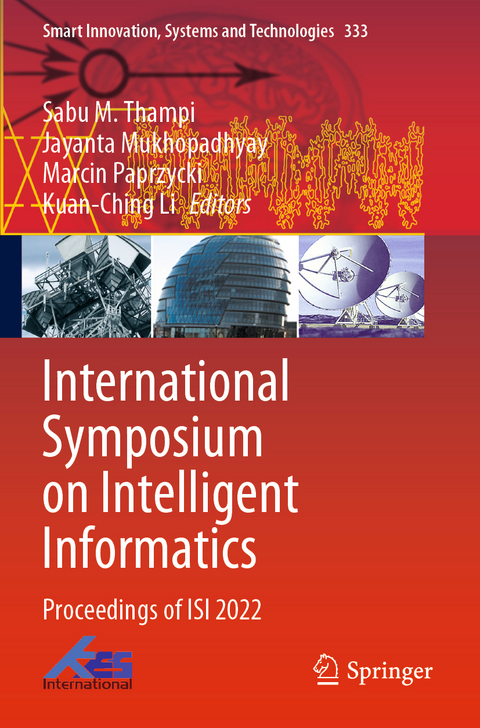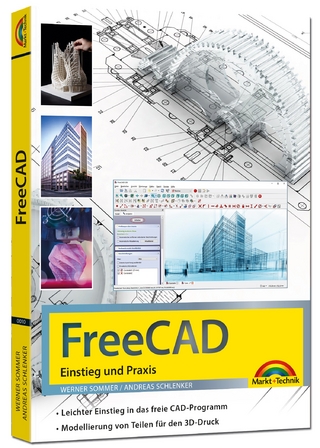
International Symposium on Intelligent Informatics
Springer Verlag, Singapore
978-981-19-8096-1 (ISBN)
Sabu M. Thampi is Professor at the School of Computer Science Engineering (SoCSE), Kerala University of Digital Sciences, Innovation and Technology (KUDSIT)—formerly IIITM-K, Technocity Campus, Trivandrum, Kerala, India. He holds a Ph.D. in Computer Engineering from the National Institute of Technology Karnataka. His current research interests include Internet of Things (IoT), cognitive security, social networks, endpoint security, and smart cyber-physical systems. He is Primary Member of Center for Research and Innovation in Cyber Threat Resilience (CRICTR) and also coordinating the Connected Systems and Intelligence Lab at KUDSIT. He has published papers in chapters, journals, and conference proceedings. He has authored and edited a few books and as well as edited about 45 conference proceedings published by Springer in different series. Sabu has served as Guest Editor for special issues in few journals and Program Committee Member for many international conferences and workshops. He has co-chaired several international workshops and conferences. He has initiated (ISTA, SSCC, SIRS, ISI, SoMMA, ACN, CoCoNet) and is also involved in the organization of several annual conferences/symposiums. Sabu is currently serving as Editor for Elsevier Journal of Network and Computer Applications (JNCA), Elsevier Journal of Engineering Applications of Artificial Intelligence (2022), Connection Science—Taylor & Francis, Associate Editor for IEEE Access and International Journal of Embedded Systems, Inderscience, UK, and Reviewer for several reputed international journals. Sabu is Senior Member of IEEE and ACM. He is Founding Chair of the ACM Trivandrum Professional Chapter. Dr. Jayanta Mukhopadhyay (Mukherjee) received his B.Tech., M.Tech., and Ph.D. degrees in Electronics and Electrical Communication Engineering from the Indian Institute of Technology (IIT),Kharagpur, in 1985, 1987, and 1990, respectively. He joined the faculty of the Department of Electronics and Electrical Communication Engineering at IIT, Kharagpur, in 1990 and later moved to the Department of Computer Science and Engineering where he is presently Professor. He also holds the office of Dean, Outreach of the Institute. He served as Head of the Computer and Informatics Center at IIT, Kharagpur, from September 2004 to July 2007. He also served as Head of the Department of Computer Science and Engineering and the School of Information and Technology from April 2010 to March 2013. He was Humboldt Research Fellow at the Technical University of Munich in Germany for one year in 2002. He also has held short-term visiting positions at the University of California, Santa Barbara, University of Southern California, and the National University of Singapore. His research interests are in image processing, pattern recognition, computer graphics, multimedia systems, and medicalinformatics. He has published more than 300 research papers in journals and conference proceedings in these areas. He received the Young Scientist Award from the Indian National Science Academy in 1992. Dr. Mukherjee is Senior Member of the IEEE. He is Fellow of the Indian National Academy of Engineering (INAE). Dr. Marcin PAPRZYCKI has an M.S. degree from the Adam Mickiewicz University in Pozna, Poland, a Ph.D. from the Southern Methodist University in Dallas, Texas, USA, and a Doctor of Science degree from the Bulgarian Academy of Sciences, Sofia, Bulgaria. He is Senior Member of IEEE, Senior Member of ACM, Senior Fulbright Lecturer, and was IEEE CS Distinguished Visitor. His original research interests were in the area of high-performance computing/parallel computing/computational mathematics. Over time, they shifted toward intelligent systems, software agents and agent systems, and application of semantic technologies, among others. Currently, he serves as Vice Chair of the IEEE Poland Section. He has contributed to more than 500 publications and was invited to the program committees of over 800 international conferences. He is on the editorial boards of 12 journals. Kuan-Ching Li is Professor in the Department of Computer Science and Information Engineering at the Providence University, Taiwan. Dr. Li is Recipient of awards from Nvidia, AWS, Intel, Ministry of Education (MOE)/Taiwan and Ministry of Science and Technology (MOST)/Taiwan, as also distinguished chair professorships from universities in China and other countries. He has been involved actively in conferences and workshops as program/general/steering conference chairman positions, numerous conferences and workshops as Program Committee Member, and has organized numerous conferences related to high-performance computing and computational science & engineering. Dr. Li is Editor-in-Chief of technical publications Connection Science (Taylor & Francis), International Journal of Computational Science and Engineering (Inderscience) and International Journal of Embedded Systems (Inderscience), also serving a number of journal’s editorial boards and guest editorships. In addition, he has been acting as Co-author and Co-editor of several technical professional books, published by CRC Press, Springer, McGraw-Hill, and IGI Global. His topics of interest include parallel and distributed computing, big data, and emerging technologies. Dr. Li is Member of AAAS, Senior Member of the IEEE, and Fellow of the IET.
Part 1: Artificial Intelligence and Machine Learning.- Chapter 1. DCLL - A Deep Network for Possible Real-time Decoding of Imagined Words.- Chapter 2. Towards Frugal Artificial Intelligence: Exploring neural network pruning and binarization.- Chapter 3. Practical Implications of Dequantization on Machine Learning Algorithms: A Survey.- Chapter 4. Encoder-Decoder Network with Guided Transmission Map: Robustness and Applicability.- Chapter 5. Development of NN-based Ball Bearing Fault Diagnosis Techniques.- Chapter 6. A data analytics-based study on campaigns and hashtags movements related to the production of fashion goods.- Chapter 7. Gradual Search and Fixed Grouping Scheme based Variant of Genetic Algorithm for Large Scale Global Optimization.- Chapter 8. Generalized symbolic dynamics weighted network prediction of chaotic time series.- Chapter 9. Automated Reduction of Detailed Biophysical Cerebellar Neurons to Izhikevich Neurons+D14.- Chapter 10. Segmentation Approach for Nucleus Cytoplasm of Ewing sarco.- Chapter 11. Deep Neuroevolution Squeezes More out of Small Neural Networks and Small Training Sets: Sample Application to MRI Brain Sequence Classification.- Part 2: Natural Language Processing.- Chapter 12. Abstractive Text Summarization of Hindi Corpus using Transformer Encoder-Decoder Model.- Chapter 13. Automatic Text Classification for Web-based Malayalam Documents.- Chapter 14. Question and Answer Generation from Text using Transformers.- Chapter 15. A Comparative Study of Spam SMS Detection using various Supervised Machine Learning Algorithms. etc.
| Erscheinungsdatum | 07.04.2024 |
|---|---|
| Reihe/Serie | Smart Innovation, Systems and Technologies |
| Zusatzinfo | 174 Illustrations, color; 40 Illustrations, black and white; XVIII, 506 p. 214 illus., 174 illus. in color. |
| Verlagsort | Singapore |
| Sprache | englisch |
| Maße | 155 x 235 mm |
| Themenwelt | Informatik ► Grafik / Design ► Digitale Bildverarbeitung |
| Informatik ► Theorie / Studium ► Künstliche Intelligenz / Robotik | |
| Technik ► Elektrotechnik / Energietechnik | |
| Schlagworte | Artificial Intelligence • cognitive computing • computer vision • data analytics • intelligent distributed systems • Intelligent Security Informatics • internet of things • Machine and Deep Learning • Natural Language Processing • Signal, Image and Speech Processing |
| ISBN-10 | 981-19-8096-9 / 9811980969 |
| ISBN-13 | 978-981-19-8096-1 / 9789811980961 |
| Zustand | Neuware |
| Informationen gemäß Produktsicherheitsverordnung (GPSR) | |
| Haben Sie eine Frage zum Produkt? |
aus dem Bereich


